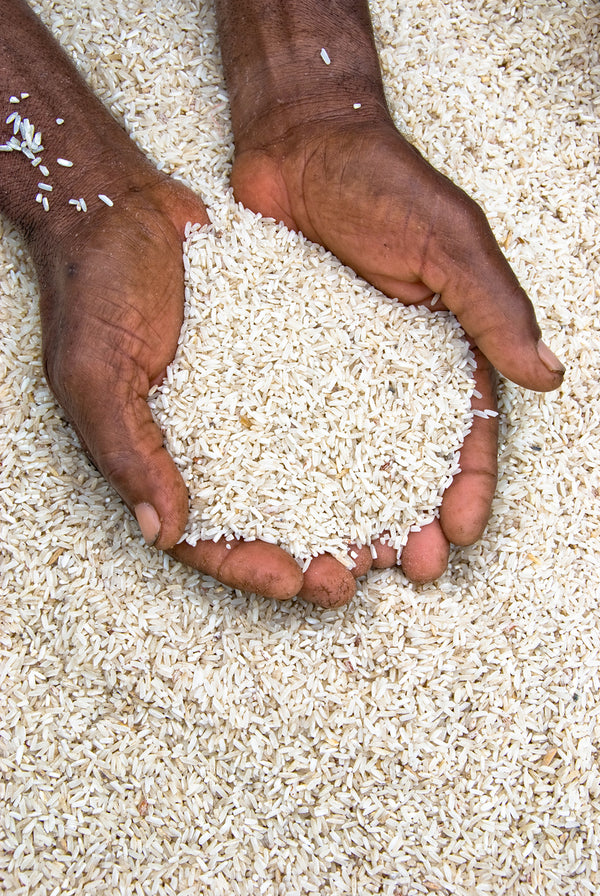J.E.D.I Justice, Equity, Diversity, and Inclusion
February 13, 2024
We believe in the power of rice to bring people together. We are the link between the farmers at the source who grow the exceptional ingredients we provide, and the people they nourish. Our products enrich meals, inspire creativity and deepen connections.
J.E.D.I.
Lotus Foods is a member of the J.E.D.I. Collaborative that "is a project of One Step Closer that aims to help natural products companies and leaders increase their abilities to actualize Justice, Equity, Diversity, and Inclusion efforts through providing educational programming, resources, and training programs designed to increase the awareness, knowledge, and skills within the company.
J.E.D.I. Collaborative aims to empower companies and leaders to increase their capacity to create space for and work alongside underrepresented communities to thrive in the natural products industry."

Enabling connection
Our quality staples help you create easy, wholesome, delicious meals to share a moment of connection with the people and food cultures that you love.
Cultivating diversity
From rice growing practices that promote biodiversity to the purposeful selection of the ingredients in our foods, we enable the diversity of flavors and traditions that you bring to the table.
Delivering more nutrition and flavor means more impact
With over half of the worlds' population living in rice-based cultures, we seek to drive impact at the source. We partner with farmers to revolutionize growing practices globally to provide quality ingredients that are regeneratively grown, more nutritious and flavorful.

We partner with small and marginal farmers, preserving traditional knowledge and local crop varieties
By nourishing each other we nourish our farmers and planet
You help us invest in means to further reduce farming emissions & natural resource use so that together, we can nourish the lives and livelihood of the farmers we depend on. At Lotus Foods, we strive to nourish connection through the world's most essential grain.
Lotus Foods’ mission has embraced the values of Justice, Equity, Diversity and Inclusion (JEDI) since its founding. It is our intention to take this commitment to a new level throughout our company and supply network.
CHALLENGES IN RICE PRODUCTION
Rice is the world’s most important food crop, and most of it is produced by small family farmers. Prevailing production practices and systemic inequities lead to indebtedness and marginalization of smallholder rice farmers as well as negative environmental outcomes. Overuse of water and fossil fuel-based fertilizers and pesticides contribute to water scarcity, soil degradation, and biodiversity loss, and rice production is a significant source of global warming through greenhouse gas emissions from flooded paddies.
LOTUS FOODS AND JEDI
We tackle these aforementioned challenges from multiple directions. We strive to source rice primarily from smallholder rice farmers, giving them access to international markets. We pay them higher prices to increase their incomes and as incentive to adopt and scale organic and regenerative growing practices such as the System of Rice Intensification (SRI) that preserve rice biodiversity, reduce work for women, save water, promote soil health and emit fewer greenhouse gasses. We advocate in our industry and international forums for changing how rice is grown, to increase global food security, conserve water, mitigate climate change and empower family farmers, especially women, who do most of the hard labor associated with rice farming. Key to our product innovation strategy is improving the accessibility to healthy rice-based products while expanding the numbers of farmers benefiting.
One supported expansion onto U.S. soil is the incredible work being done by Jubilee Justice's Black Farmers’ Rice Project. Their goal is to transform livelihoods through regenerative SRI rice production where rice farms have been implementing SRI in Alexadria Louisiana and Mound Bayou and Jackson Mississippi since 2020.
On the Jubilee Justice blog they explain: "In the United States, SRI is relatively new, with only a few farmers, mostly in the Northeast, practicing it. One large-scale farmer in Arkansas has also adopted SRI methods. Jubilee Justice is pioneering SRI research in Alexandria, La on our 17-acre organic farm. We are also working with Black farmers in the Southeast to develop organic and regenerative rice systems that address the unique challenges of American agriculture."
“If you want to understand wealth and inequality in this country, you have to understand Black land loss”

Lotus Foods’ long-term goal of working with Jubilee Justice is to support their efforts to reverse systemic racism and inequality.
OUR RENEWED COMMITMENT
Over the next five years, we will seek to elevate our commitment to this work and the principles of justice, equity, diversity and inclusion in our company and supply networks. We will articulate clearly our values and expectations throughout our supply network with a Supplier Code of Conduct. By 2025 we will double the amount of rice that we buy from farmers using regenerative and/or SRI methods. We will strive to make our branding and marketing representative of the entire US population and make our products more financially and geographically accessible. Internally, we will conduct baseline surveys, assessments and team trainings to build a company culture that makes diversity, equity and inclusion a cornerstone of our workplace policies and practices.
The Path Forward To Systemic Change
J.E.D.I Collaborative offers tools to help natural products industry leaders to implement justice, equity, diversity, and inclusion efforts throughout their organization. It includes a 10-step JEDI journey, clear commitments, suggested tactics, recommended resources and tools, a list of vetted solutions partners, and a series of recorded webinars. The commitments are holistic in that they address JEDI actions that impact consumers, company culture, and communities surrounding the business.
The commitments are holistic in that they address JEDI actions that impact consumers, company culture, and communities surrounding the business. This comprehensive approach is critical to addressing the systemic oppression that is part of our food system and our industry.


